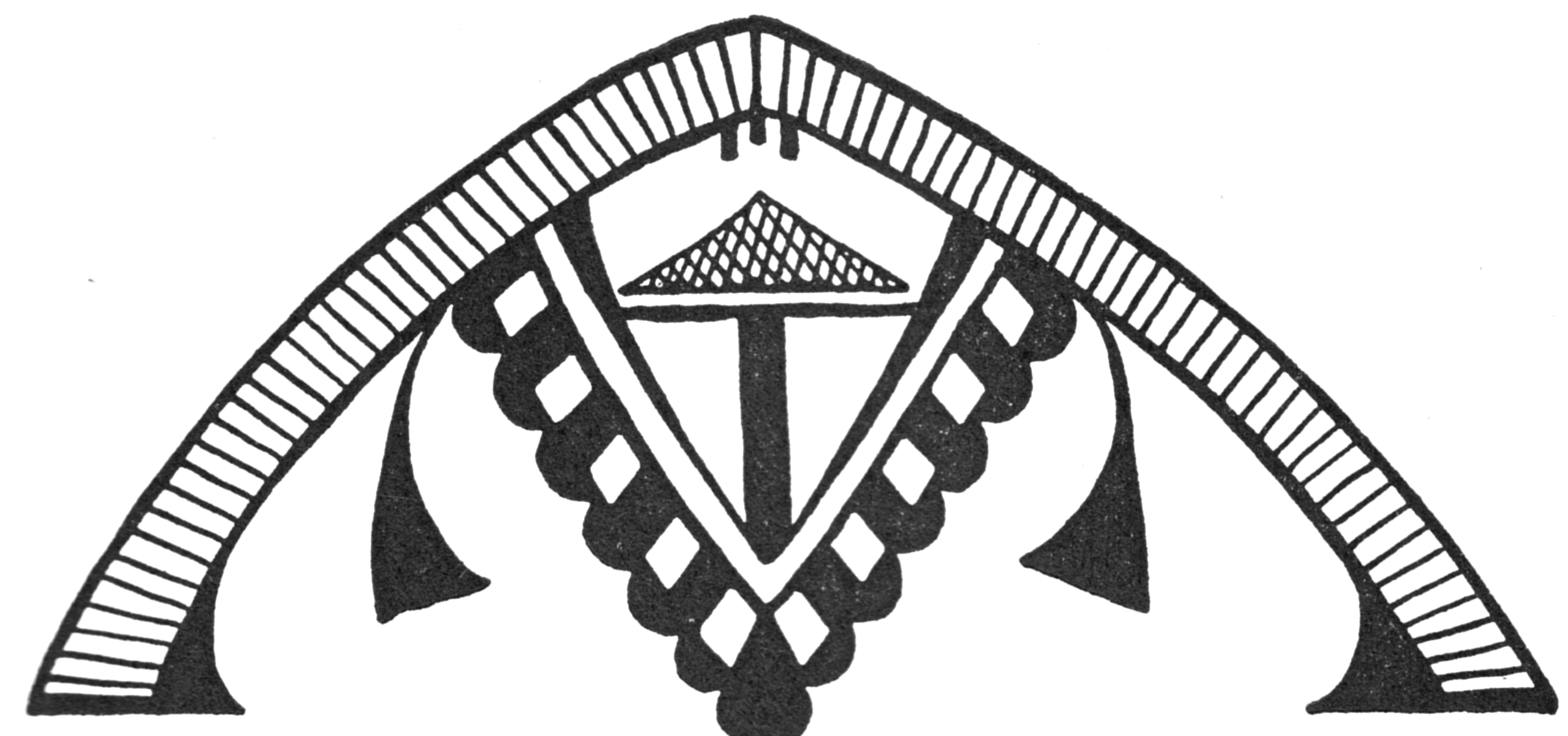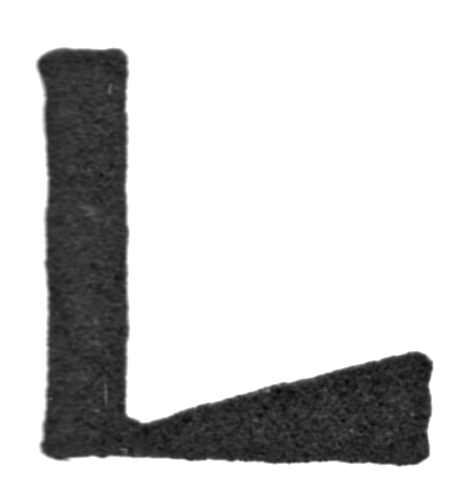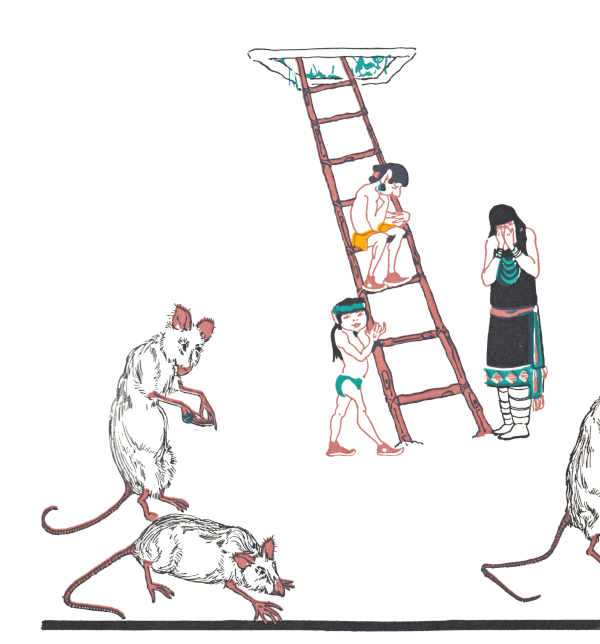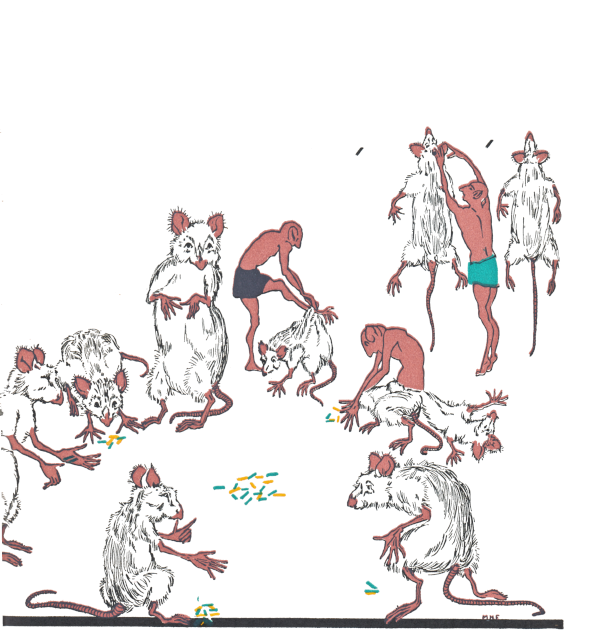| Web
and Book design,
Copyright, Kellscraft Studio 1999-2021 (Return to Web Text-ures) |
 (HOME)
|
 XV THE WITCH MAIDEN  ONG ago
when people lived in the Village of the Yellow Rocks, and also in the
Village
of the Winds, and the Village of the White Flowering Herbs, and the
Village of
Odd Waters, there dwelt a very powerful high-priest in the Village of
the
Yellow Rocks, and he had a daughter. ONG ago
when people lived in the Village of the Yellow Rocks, and also in the
Village
of the Winds, and the Village of the White Flowering Herbs, and the
Village of
Odd Waters, there dwelt a very powerful high-priest in the Village of
the
Yellow Rocks, and he had a daughter. Now this maiden was tall and slender and very swift of foot. When she was born the Gods said that she would not be as other maidens, but should possess the magic knowledge of the hunt, and be as the wild things of the forest themselves. She could speak the language of the deer, the antelope and the rabbits as well as other animals, and she knew their habits and understood their natures. The Gods had wished this maiden to be of great help to her people, and in time, to become a very powerful medicine-woman. This girl, however, was exceedingly selfish, and when she learned of her strange magic, she wished to keep the animals for herself. Early each morning she would run to the mesa-forests, and using her charms, she would gather together all of the deer and the antelope and the rabbits, and drive them on to the top of a high mountain where she had built a huge corral. The hunters of the village hunted in vain, and they returned to their homes at night-fall weary, and with only the weapons they took with them. But the maiden would go to the corral and kill whatever animal she wanted, and her family had meat and buckskins with which to make moccasins and apparel, while others went without. Now this maiden was very beautiful, and was looked upon by many a young man as the flower of his heart. So there came one day from the Village of the Winds, a youth who carried a bundle on his shoulder. This bundle contained various precious things such as necklaces, snow-white buckskin moccasins and leggings, and embroidered skirts and mantles. When the young man reached the Village of the Yellow Rocks he knew the home of the maiden by the beauty of the house. Attached to the entrance ladder was a carved cross-piece, and hanging from this crosspiece was a fringe made of black hair and hollow stalactites from a sacred cave. When the wind blew them together they sounded like bells, and no sooner had the strange youth touched the ladder rung, than they sang out their tinkling warning to those within. The youth entered the house, and giving the bundle to the maiden, sat in front of the fire by the side of the old priest, her father. "It is not customary for a stranger to visit the house of a stranger without saying something of what may be in his thoughts," said the old man. "It is quite true," said the youth. "I come thinking of this maiden, your daughter." Then the maiden brought food for the youth, and, telling him to eat, she sat down next to him and also ate something. This was the sign that she looked with pleasure upon him, and her father was glad. After the young man had finished the maiden drew him apart, and spoke to him. "Before I will think of you as my husband, you must go out in the early morning, when the deer cross the mesas, and slay me a fine one. Then I will marry you." "It is well," said the youth, and he wrapped himself in his blanket and fell asleep. He arose early the next morning, and the maiden gave him food for the day. He gathered up his bow and his arrows, and joyfully departed, feeling sure that he would be successful, and bring back a splendid deer to this maiden. All day he walked through the forests, and although he saw many tracks, yet the deer had vanished. While the young man was hunting the girl went out to see that her deer were safe. She went into the river, and followed it against the current so that none could see her tracks, and all day she worked her magic, and kept the deer in the corral. When night time came, the poor youth, tired and hungry, entered the house with the tinkling bells. "Where is the deer?" asked the maiden. And when the youth told her of his misfortune, she gave him his bundle and told him to depart. On the very next day a youth from Hálona heard of this. "O, ho!" said he. "He did not take her enough presents. I will carry her a bundle that will make everything all right." And he gathered up many treasures, for he was wealthy, and his bundle was heavy. He went to the house of the maiden, and when his hand touched the ladder there was a jingling that announced his coming. Everything happened as with the youth from the Village of the Winds. The maiden said that she would only marry a good hunter, and she sent him forth in the early morning. The maiden went up the river and watched over her animals; and the young man hunted and hunted without success. In the evening she gave him his bundle and sent him away. The next day there was a youth in the Salt City who heard of this, not all of course, but he heard of the young men who courted the maiden and were turned away. He said, "I dare say they didn't take enough with them." So he made up two bundles, and went to the home of the maiden. Now this youth fared no better than the others, and weary and ashamed, he returned to his home. Finally this matter became so much talked about that the two Gods of War who lived on the Sacred Mountain with their grandmother, said, "There is something wrong here. We will go and court this maiden. The two Gods were really among the most magnificent of men; but, having the power to take on any form they chose, they became very ugly, little dwarfs with crooked backs and great heads. "Ah, ha!" said the elder. "When I look at you, you are very handsome." And he roared with laughter. And the younger said to him, "O, ho, when I look at you I find you so extremely handsome that I fear the Maiden will love you at once." And he rolled on the ground, and kicked his heels together with merriment. The younger brother made up a bundle, a miserable little bundle it was, containing only little rocks and sticks and bits of buckskin. "What are you carrying that bundle for?" asked Ahaiyúta, the elder brother. "I am taking it as a present to the Maiden," said Mátsailéma, the younger one. "She doesn't want any such trash as that," said the other. "All of the youths took very valuable presents to her." And so they decided to throw the bundle away altogether, and they started out with nothing but their bows and arrows. As they journeyed on they saw a great many woodrats. They killed a large number of the creatures, and they made a long string of them tied up by their tails. — "There!" exclaimed the elder brother, "there is a fine present for the girl." They knew perfectly well how things were, and they wanted to punish the selfish maiden, and help the poor hunters of the Cities of Cibola. When they approached the village the elder brother began to get very bashful. "I wonder which house it is," he said. "The one with the tallest ladder in front of it, of course," said the younger. Then the elder brother said in a low voice, "Now do behave yourself; be dignified." "All right," replied the younger. They went up the ladder very carefully, so that there was not a tinkle from the bells. The elder brother hesitated, while the younger one went on and over the edge of the house. "Now!" cried he. "Keep still!" whispered the other; and he gave the ladder a little shake as he went, and the bells sang out that a stranger was coming. The elder brother walked down the ladder that led into the house from the roof, in a proper fashion; but Mátsailéma came tumbling down with the long string of rats trailing behind him. The old father of the girl told them to be seated and then he added, — "It seems that you have met with luck today in hunting." And he cast his eyes on the string of rats. "Yes," said the two at once. "Why have you come to my house?" asked the old priest. "We have come thinking of your daughter," said the elder brother. "We understand that she has been wooed by various young men, and it has occurred to us that they did not bring the right kind of presents." "So we brought these," said the younger as he gave the rats a terrific kick. The old man called his daughter and told her to bring food for the two little men. She did this and when she heard of the object of their visit, she smiled behind her lifted mantle, and asked which of them wished to marry her. "We both do," said the younger brother. "But we will settle that later," said the elder. Now the maiden did not worry as she told herself that she could easily get rid of the ugly little beings; and she told them, as she had the others, that they must bring her a deer. "It is well," they said, so the maiden left them. The next morning the younger brother was up before anyone else, and he went about shouting, "The sun is rising. Get up! Get up!" And the elder brother could do nothing with him. The maiden gave them some food, and asked them which direction they would take. "We will go to the south," they said. "We will surely get a deer before long, although we are small, and we do not usually have very good luck." The maiden watched them from the house-top. "Miserable little wretches!" she said. "I'll teach them to come courting me in this way." The brothers went off to the cliffs, and, while pretending to be hunting, they ran back through the bushes, and hiding near the house, waited to see what the maiden would do. In a little while she came out. They saw her go down the valley, and then into the river, leaving no trail behind, and she worked her way quickly up the stream and disappeared in the trees. They ran on ahead, and long before she had ascended the river, found the path leading out of it and up the mountain to the corral. Then they saw thousands of deer, mountain sheep, antelope and other animals. "Ha! Here is the place!" cried the younger brother, and just as the maiden was climbing the cliff he pulled out his bow and let fly an arrow at the largest deer. The elder brother looked at the maiden and said, — "You come, do you?" "Yes," said the maiden, and her heart was very heavy. "You are late; we got here before you," said Ahaiyúta. "I see you have killed a deer," said the girl. "I killed one," said the younger brother. "Come, girl, and help us skin him. We are so little and hungry and tired we can't do it. Come on." And the maiden went forward slowly, and helped them skin the deer. Then the brothers began to shoot more deer, and they tried to drag them out of the corral; but they were so small that with all of their tugging they could not move the large bodies, and the maiden had to help them again. Then they cut up the meat and made it into bundles, and of course the girl had to carry the large one while the two brothers had but little ones. "Now," they said, "we have done a good day's work, haven't we?" And they looked at the maiden with twinkling eyes. The girl did not answer them, but walking sadly apart, she spoke kindly to all of her animals. She lifted to one side some of the logs that formed the corral, and she called to her creatures and told them that they were free to return to the forests. Then she rejoined the two Gods, and together they went to the home of her father. That night when they were sitting around the fire, and eating their evening meal, the elder brother said, — "Well, maiden, which one of us will you have for your husband?" "Although you have proven yourselves good hunters," replied the maiden, "yet will I not marry either of you until you have shown yourselves capable of taking care of, and dressing, the buckskins that I have piled in an upper room of our house." "Let us see them," said the younger brother. So the maiden led them into a room piled high with skins, and said, — "I have no brothers to soften and scrape them; therefore tomorrow you two must do this for me. And when the sun is setting you must have them thin and soft as fine cotton, then I will consent to be the wife of one of you." They pretended to be cast down, and shook their big heads, and murmured that it would take them a full year to scrape so many hides, small and weak as they were. And the maiden believed them, and was glad. Now the two little men did not wait for the sun to rise the next morning, but long before the morning star had left the sky, they were busy tying the skins into bundles, and hauling them to the river. They spread them out in the water that they might soak, and they built a little dam so they would not float away. And in the first gray light of the awakening day, while the little men were busy pulling the skins about they heard a great many people talking, so they stopped their work and listened. Now, the hill that stands across from the Village of the Yellow Rocks was the favorite home of the Fieldmice. These little creatures had very large families, and were always collecting bits of wool for their children. But they were terrible gamblers, and they would even bet away their nests, and the young mice, being perfectly bare, with no hair on them at all, died of cold. They were having a big game, and many of them talked very loud, for mice, when they were betting, and it was these mice that the two Gods overheard. "Let us go nearer," said the elder brother, and they went across the river, and they heard the tiny, little voices calling out and shouting. The Maiden covered her face with her hands and wept for the old Mouse with the broken tail had won.  "Let us go in," said the younger brother, and down the hole they went. They found an enormous village of Field-mice in human form, their clothes, in the shape of mice, were hanging over the sides of the houses. Some of them had their clothes off down to their waists, and were betting as hard as they could, and talking to one another. The mice were not very polite, and most of them kept right on playing their game, and did not even greet the brothers. Finally, one cross old Field-mouse with a broken tail, stopped long enough to say, — "What had you in mind in coming, you ugly, little men." The Gods knew that this was just the way of the Field-mice, and so the elder told them their story. "What is this you have to do?" asked the mice. °Clean all the hair off those pelts before sunset," said the brothers. The mice stopped their game, they looked around at one another, and their eyes sparkled. "Now then we will help you if you will promise us something," they said. "But we want your solemn promise." "What is that?" asked the brothers. "That you will give us all the hair," cried the mice. "O, certainly," said the Gods. "We will be glad to get rid of it." And then the mice poured out of the hole, and they were so numerous that it was like water, when the rain is falling hard, running over a rock. The brothers drew the skins on the bank, and the Field-mice went to nibbling the hair and cleaning off the underside. The Gods kept eight skins aside that they might seemingly be finishing the huge task when the maiden would appear. She came at noon, and said, "How are you getting along?" "We have finished four and are at work on the fifth," they told her, and she went away laughing. So they worked away until a little before sunset, when she came again to the river bank. They had just finished the last pelt, and had placed it on the sands where all the others were spread out, and it looked as though a great white cloud had settled there. The maiden was surprised beyond belief. She looked and looked, and counted and recounted the skins, and she found them all there. Then she bit her lip from vexation, and said, "I shall have to submit. Which of you shall I marry?" The little men danced around her, and cried out, — "Choose the handsomer! Choose the handsomer!" And they made dreadful faces and assumed queer postures. The maiden was terrified, and she realized for the first time, that these beings were not men, but Gods. She covered her face with her hands and wept, and between her sobs she said, — "I can not choose." "Then we will call the mice," said the elder brother. "We will have a great game, and the one that wins shall have you for his wife." The younger brother called loudly and the mice came, and they betted and betted all through the night, and the maiden watched them in terror. Finally, just before Dawn, the old mouse with the broken tail won, and came forward to claim the maiden. "She has suffered enough," said Ahaiyúta, and changing himself into the great War-God he really was, he wrapped her in a cloud and carried her away to the top of To'yállanne. The old mouse was disappointed as he would have liked to have had such a fine wife; but the others laughed at him, and said that they had not really wanted the maiden in their village, but that they could never let a betting game go by them. Then Mátsailéma, the younger of the War-Gods, also assumed the shape of a handsome warrior, wonderful to look upon, and went to the house of the high-priest, the maiden's father, and commanded him to call together the Priests of the Bow. When they were assembled in council he spoke to them saying, — "Know that we are the War-Gods of To'yállanne. Our names shall be known among the children of men as the Twain who hold the high places of the earth. "Ahaiyúta, the elder and greater has taken the Witch Maiden from. you forever. And I, Mátsailéma, the younger and fiercer, tell you to bid the hunters go forth for there is game in great plenty on mesa and in forest. "You, Priests of the Bow, make for us a fine altar. Lay before us the streaked stone of lightning and the black stone of thunder." And the Chief Priest of the Bow put on his shoulder the plume-wand of man-folk, and then painted the round mark of thunder, and the waving trail of the lightning, and rising he blew upward the smoke clouds. Then Mátsailéma left them, and lo, the world was alight with sunshine, and bending above was the rainbow. |